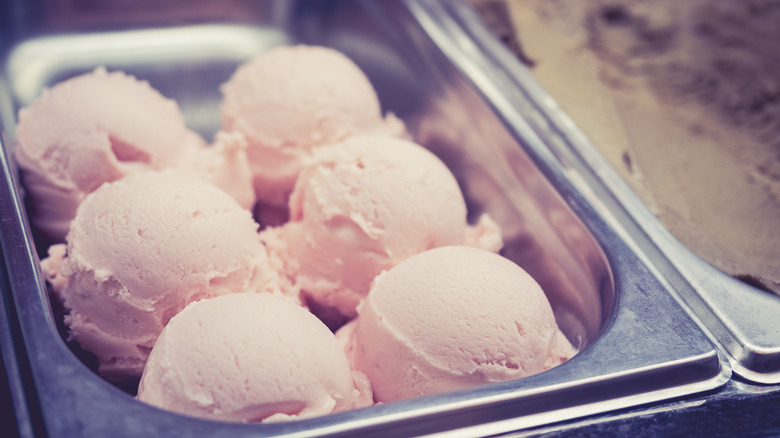Are There Any Real Benefits To Aging Ice Cream Custard Before Churning?
Making homemade ice cream may seem like a daunting task, but it can be a fun activity that can result in original flavor combinations you'd never find in an actual scoop shop. And just like you can make ice cream at home, you can also make ice cream's more velvety cousin, frozen custard. In general, every online recipe you can find for frozen custard will tell you the same thing: you should let the custard base age while chilling overnight before you get to churning.
But what if you don't want to wait? Do you absolutely have to let the base age first? Are there even any actual benefits to aging ice cream custard before churning? Yes, but they have nothing to do with how it makes the end result taste. Instead, the benefits are entirely based on how much easier it makes the preparation process. It turns out that if you age your ice cream custard before churning it, your life will be a lot easier.
Frozen custard is distinct from ice cream
To understand why this works, it's essential to understand what frozen custard is. It's not ice cream, though the two share many similar elements like sugar, milk, and cream. The main difference is one additional ingredient: egg yolks. Ice cream does sometimes have eggs, but in order to legally qualify as ice cream, a dessert can't be more than 1.4% egg yolks. Frozen custard, though, can go a lot higher, which is why it produces a denser, more velvety end product that doesn't need to be kept as cold as regular ice cream because the eggs keep it from melting as quickly. It was originally native to Coney Island, New York, but it's since spread across the country; you can get green chile frozen custard in New Mexico, for example.
So then, why do all the recipes tell you to make sure to chill and let it age before you finish the process? So that you can avoid exhausting yourself while you get your custard on.
If you don't let your custard base chill overnight, it's a pain
Simply put, a frozen custard base that's more thoroughly chilled over a longer period will be much easier to churn. You can accomplish the same effect the same day if you want, but you'll need to use an ice bath for the ice cream, and that's just adding extra steps. There's also some evidence giving the custard base a longer amount of time to chill results in a smoother, creamier end product, possibly because of how the emulsifiers in the egg yolks interact with the rest of the mixture — although there's no hard evidence on the subject either way. The taste may not be affected, but maybe the texture is.
Whatever the case, it seems like there's good reason to age your custard base overnight, even if it's only to save yourself some hassle. In cooking, though, sometimes that can make all the difference.


